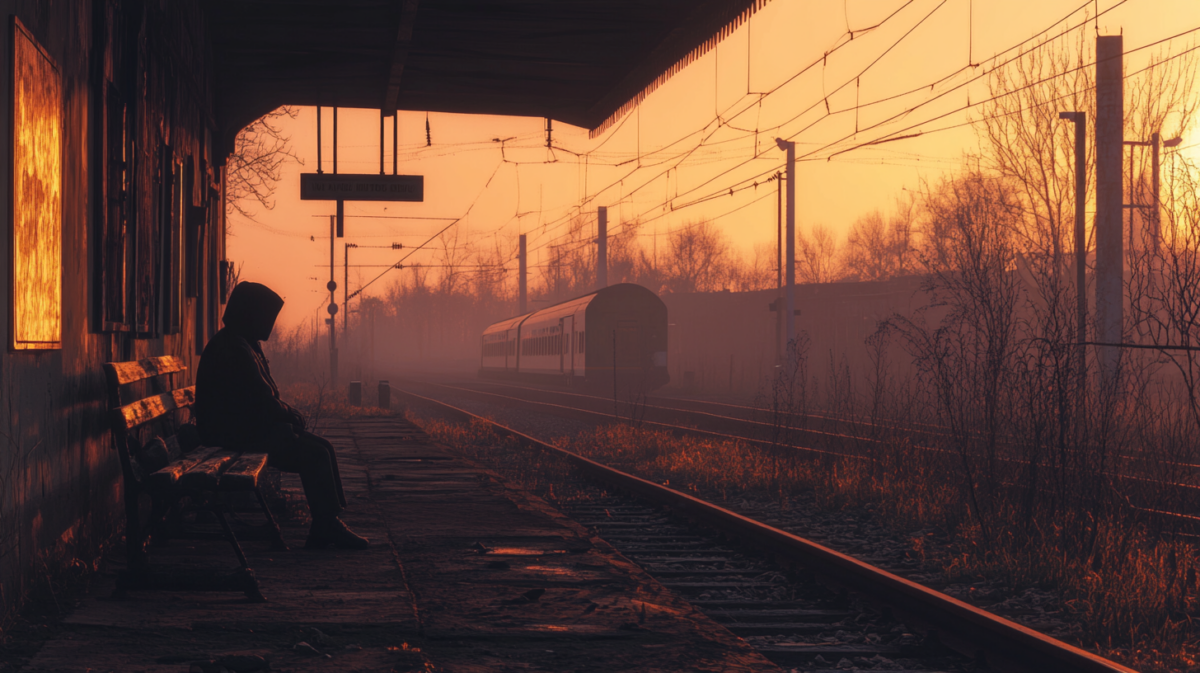
The Shape of Waiting
Micah settled onto the bench, the wood rough and uneven beneath him. It shifted under his weight, the faint creak breaking the quiet. The air smelled of rust and damp earth, thick with the weight of long-settled time. Above him, the sign for Haven Crossing hung crooked, its letters faded to a reddish blur.
He stared down the tracks, where the rails dissolved into the pale haze of the horizon. For a moment, he let himself imagine it: the train emerging from the distance, the faint hum of its approach traveling through the ground. Andre would step off, his bag hanging loose on one shoulder, his smile easy and unearned. “I told you I’d come,” Andre might say, his voice light but never matching the weight of the words.
The rails stayed quiet.
Micah leaned back, the uneven slats pressing into his shoulders. He didn’t need to check the time; he was always early, and the train was always late. At first, the waiting had felt steady, almost comforting—a rhythm to anchor him. Saturdays at seven. Andre’s promises had seemed solid enough to lean on: Soon. Next week. I just need to sort a few things out.
He had arranged those words carefully, stacking them in his mind like stones, something to hold onto. But now, they felt brittle, their weight collapsing inward. His hands brushed his knees, a restless motion, as though testing the strength of something he already knew was giving way.
The station was quiet, but not still. The air carried the faint rustle of leaves from the trees beyond the tracks, and behind him, the town murmured—a distant hum of cars and voices, softened to a whisper by the evening.
Micah pulled his jacket tighter as the first stars appeared, faint and uneven, their light too distant to fill the dark. Then, faintly, he heard it: the crunch of footsteps on gravel.
He kept his gaze on the tracks, but his ears followed the sound. The footsteps were steady, deliberate—each one measured, unhurried. He turned as the figure emerged at the far edge of the platform: a man, older, his coat hanging loose on his frame, the cuffs frayed and worn soft with age.
The man walked past the empty benches and sat down beside Micah. His movements were deliberate, as though sitting required thought. The bench creaked as he settled, its weight pressing into the quiet. For a moment, neither of them spoke.
Micah glanced at the man, then at the other vacant benches scattered along the platform. He wondered, briefly, why this one.
The man rested his hands on his thighs, his fingers loose but still, his gaze locked on the tracks. His coat looked heavy, its fabric sagging with wear, as though it had weathered one too many seasons.
“Funny thing,” the man said quietly, not looking at Micah. “No matter which bench you pick, it always feels like you’re waiting in the same place.”
Micah studied him, unsure whether to respond. The man’s voice was low and steady, like it was meant for the air between them, not for conversation.
“You’re waiting for someone?” Micah asked after a moment, his voice cautious.
The man didn’t answer right away. His gaze stayed on the tracks, his shoulders just barely hunched, as though he were bracing for something he already knew wouldn’t come. “You could say that,” he said finally.
Micah shifted, the movement small but uneasy. He didn’t press.
“She told me to wait here,” the man said, leaning forward with his elbows on his knees. His voice was calm, but the words frayed at the edges, unraveling as they settled into the quiet. “So I did.”
He paused, his thumb brushing the edge of the bench where the wood had been worn smooth. “At first, I thought maybe she was delayed. Maybe something came up. You tell yourself those things—they make it easier to keep going.” His voice stayed steady, almost detached, but his eyes had gone unfocused. “But after a while…” He let the sentence drift, his shoulders lifting in a faint shrug. “After a while, you stop waiting for the train. You just keep waiting because you don’t know how to stop.”
Micah lowered his eyes to his hands, his fingers tracing the grain of the wood beneath him. The man’s words hung in the air, pressing into Micah like a weight he hadn’t noticed until now.
The man stood suddenly, brushing off his coat with deliberate care. “Well,” he said, his tone almost light, but his expression gave nothing away. “I think I’m done waiting.”
Micah watched as the man walked away, his footsteps fading into the stillness. The bench felt harder beneath him, though he hadn’t moved. He leaned forward, his elbows on his knees, his eyes settling on the tracks. He tried to summon the image again: Andre stepping off the train, his bag hanging low, his grin as effortless as always. But the picture wouldn’t come.
He tried anyway, reaching for it the way he’d clung to Andre’s words. But the harder he focused, the further it slipped. All that remained was the stretch of rails, gleaming faintly under the station’s single light strip, sharp and unyielding against the dark.
Micah sat there a moment longer, the chill of the night pressing into his skin. Then, slowly, he stood. His legs felt stiff, as though he’d stayed longer than he meant to. He slid his hands into his jacket pockets, his fingers curling loosely inside.
At the edge of the platform, he paused. The air was sharper here, colder, but it carried no bite. Above him, the stars came into focus, faint and steady, brushing the outlines of the trees like a quiet promise.
Micah stepped forward. The gravel shifted under his shoes, each step quieter than the last, until the platform fell behind him, swallowed by the dark.
He didn’t look back.